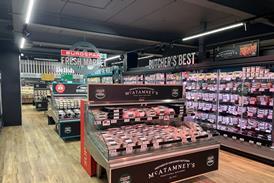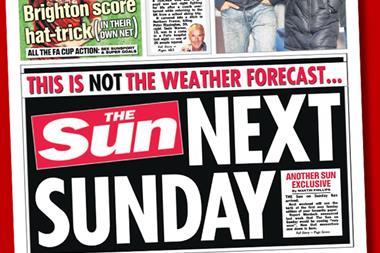On Wednesday, October 12 news retailers from across the country marched on Downing Street armed with a petition demanding an industry overhaul. Some 25,000 people have signed the Press for Reform petition, which specifically calls for the industry to be referred to the Competition Commission for a review.
The National Federation of Retail Newsagents (NFRN), which instigated the petition and march, has been on the warpath in an effort to right a number of industry wrongs and turn around a situation which has only worsened since the Office of Fair Trading (OFT) published its review of the news industry in September 2009. At the time, the OFT decided not to allow a full Competition Commission investigation into the news and magazine supply chain. Instead it expected intervention by publishers and distributors to prevent monopoly wholesalers from imposing carriage charges and delivering poor services, according to the NFRN.
That didn’t happen and the NFRN and Association of News Retailing (ANR) have worked together to reveal evidence to the OFT of the abuse caused to retailers by the current system.
The list of news retailers’ grievances is extensive, centring on carriage cost increases reduced margins lack of retailers’ control over supply and poor wholesaler service.
In the past two years wholesalers have twice imposed inflation-busting carriage charge increases, equating to a 10% increase, while publishers have lined up to reduce retailer margins. Most recently The Guardian newspaper reduced the percentage margin from 25% to 24% when it raised its Monday to Friday cover price from £1 to £1.20. The Guardian insisted that economic conditions had necessitated the decision - and all the while the newspaper industry continues to struggle, it is hard to see an increase in margins. The ANR estimates that the combination of carriage cost increases and declining margins has squeezed retail gross margins to as little as 15.73%. At the same time, wholesalers have significantly increased their own profits “far above the rate of increasing haulage costs”, it says. Paul Baxter, chief executive of the NFRN, adds that some retailers “are probably working off single-figure margins”.
The NFRN points out that publishers’ and wholesalers’ tight control of copy allocation has starved independents of best-selling titles “which is discriminatory and prevents consumers from buying the titles they want from the outlet of their choice”. This has resulted in retailers receiving only 60% of on-promotion magazines they ordered, the ANR told the OFT in its latest submission to the body.
Baxter says the current system is forcing some 1,000 local retailers out of business each year.
However, the issues have been around for the past 30 years, so why would the OFT refer the industry to the Competition Commission now when it hasn’t done so before?
“In 2009 the OFT didn’t give the industry a clean bill of health, and it told us it would look at the issues again in two years if the situation didn’t improve,” says Baxter. “We believe we’ve met all the prioritisation principles the OFT requires to trigger a review.” He concedes that the NFRN has allowed too much emotion to muddy the waters in the past, but this time “we’re focusing on the issues and facts”.
In order to improve industry practice, the NFRN has made a number of proposals to the OFT. These include: the removal of fixed printed cover prices from newspapers and magazines the removal of carriage charges imposed by wholesalers the opportunity for retailers to have more control over their supply and a legally underpinned and independently enforced service level agreement. “An independent legal entity to regulate would solve a lot of problems in the industry,” Baxter says. “We’re just trying to make news and magazines equal to all other products sold in CTNs and convenience stores.”
News retailers also have political support, with MPs tabling an early day motion in Parliament to back the cause. EDM 2246, tabled by Adrian Sanders MP and Andrew George MP, calls for the House to support “the call of the Association of News Retailing for the OFT to undertake a full investigation into the supply of news and magazines to retailers… and urges the OFT to recommend a full market review and for the issue to be debated in Parliament at the next opportunity”.
With so much focus on the Press for Reform campaign, it’s easy to forget that news retailers faced a further challenge just a few months ago when the News of the World closed. In the weeks following its demise it looked as if home news delivery (HND) was on its knees as customers hesitated to order replacements for the defunct red top. But other Sunday titles upped their game to regain the lost market, and HND was protected. However, Baxter says about a million Sunday copies are still missing, representing 15-18% of the market. “A new Sunday launch from News International is inevitable, especially when there’s a gap in the market,” he adds. “But if more scandal from News International emerges or if the gap is reduced by another title then it’ll be delayed. If it doesn’t happen next year, it never will.”
2012 could indeed prove to be a seminal year in the news and magazine industry.
“Cover prices hurt the most - customersblame us”
Lionel Cashin, of the News Shop in Market Weighton, York, says Menzies charges £47.60 a week for the “privilege” of having the wholesaler bring products to his shop. “Palmer & Harvey don’t do that,” he adds ruefully. And with any other category, retailers can pass on the extra charge to the consumer, but not so with fixed-priced newspapers and magazines. “In a marketplace which is declining, when you’re charging for delivery and increasing that charge, carriage charges become crucial,” Lionel says. He would welcome an industry review, but is wary of the influence publishers hold over politicians, despite the hacking scandal which generated criticism of the press from MPs of all colours.
But it is not all doom and gloom. He says the sector remains viable, with national newspaper sales holding up and his range of specialist magazines performing especially well. Sunday newspapers have recovered lost ground following the News of the World closure in July, with most of his home news delivery (HND) customers transferring to another title. However, the plight of regional newspapers has taken its toll, Lionel says. Two local papers, based in York and Hull, have cancelled their evening editions. Now that they are being delivered in the morning a “significant number of people have chosen not to buy them, because they previously bought them in the evening to get the day’s news,” he adds.
Jon Ellis, of Town Common News in Christchurch, Dorset, is upbeat about the current state of play. He says newspaper and magazine sales are holding up well, and his home delivery service is on a moderate upward trend. “I started marketing HND more and it has paid off. In addition to newspapers, TV listings and women’s magazines are popular.” However, he is less positive about the monopolistic nature of the wholesale industry. “You cannot help thinking they have the upper hand. You end up with the product they want rather than what you want.” Jon says cover price rises hurt most because “customers blame us - they think we’re making more money from it when we’re not”. However, he believes newspapers and magazines should remain fixed priced to protect small retailers. “If printed cover prices were removed, supermarkets would reduce the price on newspapers and the top 10 or 20 magazines and that would make us look expensive.”
Brighton retailer Guy Wright runs a thriving HND service from The Kiosk, with up to 250-300 deliveries which include a local hotel and residential home. However, he harbours concerns about the younger generation’s modest consumption of newspapers due to the internet, although he says many buy weekend papers. Guy has been hit by The Guardian’s cover price rise and sales have nearly halved, while The Independent’s 20p sister title, i, is “bloody annoying” because people have stopped buying the former and his margins have suffered.
However, his main gripe is with his wholesaler, Smiths News. Some of his complaints are as follows: it halves paper deliveries for no reason on a recent Sunday it didn’t deliver any copies of local paper The Argus and magazines often come without supplements.He says Smiths calculates deliveries on last year’s figures, but doesn’t take into account the reasons for those sales trends, such as unseasonable weather.
He says its communication strategy needs to be made more efficient, too. When there’s a problem he has to phone the national call centre in Reading, which then contacts the local distribution centre in Lancing.
One of his HND customers orders Country Life, but sometimes Smiths doesn’t send it. Conversely, he gets French title L’Equipe, which he always sends back. “I spend my whole time arguing with Smiths News. With any other supplier you could go elsewhere, but with news and mags you’re at their mercy.”











![WG-4003[58]](https://d2dyh47stel7w4.cloudfront.net/Pictures/274x183/4/5/1/353451_wg400358_6083.jpg)
















No comments yet